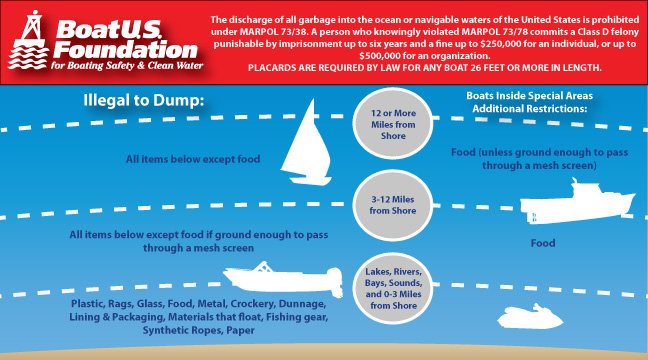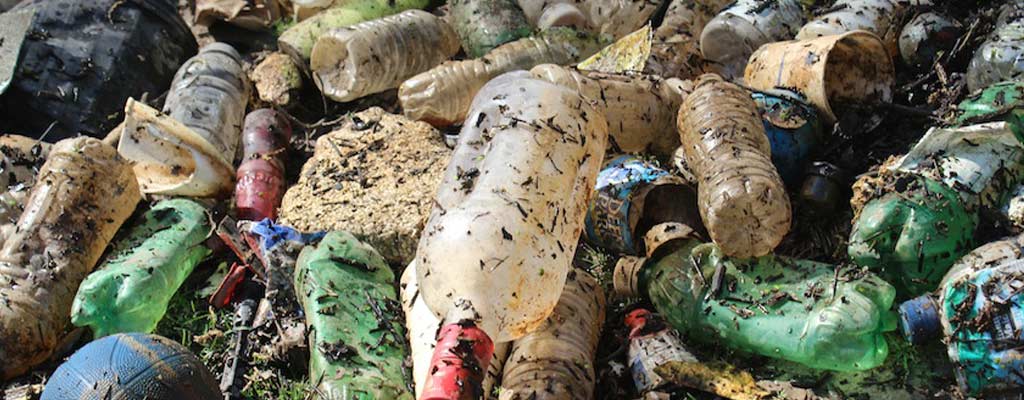Trash and Marine Debris
On the water, trash can quickly become marine debris. Marine debris is any manufactured item that ends up as trash in our oceans, lakes, or inland waterways.
More than an eyesore, trash in the ocean is one of the world's most pervasive pollution problems. It sickens and kills marine animals and birds. It also undermines economies based on tourism and fisheries. While as much as 80 percent of marine debris is said to come from land-based activities, as boaters, we need to do our part.
Laws
Under federal law, it is illegal to toss ANY garbage from a boat while you are anywhere in lakes, rivers, bays, sounds, and offshore in the ocean less than 3 miles. Recent changes to MARPOL (marine pollution guidelines) Annex V went into effect on January 1, 2013. All U.S. boats (commercial and recreational) must now comply with these changes. Below is a chart of what cannot be discharged from a boat.

Read More About This Topic
- Waste Management & Recycling
- How to Build Your Own Monofilament Recycling Bin
- Other Waste Disposal
"Special areas" include the Wider Caribbean region which includes the Gulf of Mexico and the Caribbean Sea. Click here for more information on special areas.
Additionally, all boats 26 ft or more in length must have a written garbage placard and an oil discharge placard "prominently posted" to remind you and your crew what can be thrown overboard and what can't. The placards must be permanently attached, be made of durable material, and must be at least 5X9 inches in size. Until U.S. regulations are updated to reflect the new garbage discharge requirements and placards are readily available, U.S. flagged ships operating exclusively in U.S. waters may continue to use existing placards. Placards can be found at your local boating retail store.
Violations may result in civil penalties up to $25,000, a fine of up to $250,000 for an individual or up to $500,000 for an organization and/or a prison sentence of up to 6 years. State anti-littering laws may also apply on your boating waters.
Boats 40 ft and longer must also have a written waste management plan, stating how you deal with the collected waste onboard, who handles it, and where it is disposed. This can be as short as one paragraph. We recommend that you keep your plan in your onboard ship's papers. For a sample waste management plan, click here.
Please note that this law only covers garbage, and does not cover sewage (black water) or sink or shower water (grey water). Learn more about these in our sewage section.
Impacts
Human Health and Safety
Discarded items that can pose an immediate safety threat include broken glass that can cut bare feet and discarded rope, line, bags, or sheeting that may seem harmless but can entangle divers and disable boat propellers.
Aesthetic and Economic Impacts
Shorelines covered with litter are unattractive and often hazardous. They can keep tourists and recreational users away and impact local economies. Common debris items often last for weeks, months, or even hundreds of years in the marine environment.
Habitat Destruction
Debris can affect the water quality of aquatic habitats and also cause physical damage. Submerged debris can cover coral reefs, smother sea grasses, and harm other bottom-dwelling species.
Wildlife Entanglement and Ingestion
Monofilament line, fishing nets, six-pack holders, and strapping bands are some of the worst culprits for wildlife entanglements. Some animals mistake plastic debris for food and eat it, causing serious harm to the animal.
Prevention
- Make a rule that nothing goes overboard.
- Have sturdy trash and recycling containers with lids on your boat.
- Bring all of your trash back when going out on the water.
- Properly dispose of cigarette butts.
- Purchase reusable products, containers and water bottles.
- Save and re-use plastic bags.
- Recycle your plastic, metal, glass, paper products and monofilament fishing line.
- Be sure to stow or tie down all gear when underway on the water or the highway.
- Participate in a cleanup event - especially in areas accessible only by boat.

